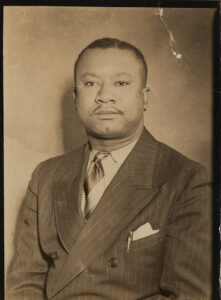When people picture the Civil Rights Movement, they often think of faces such as Martin Luther King Jr, Rosa Parks and Malcolm X.
People often overlook Southern civil rights activists, but Willie Griffin, a professor at UNC Charlotte, is helping people realize there are Southern civil rights activists, even in North Carolina.
Griffin came to WCU Mar. 18 to speak about the Civil Rights Movement in the South, specifically North Carolina.

Griffin is a Charlotte native who has an extremely notable past. He received his Ph.D. from UNC Chapel Hill, worked at the Smithsonian Museum of African American Culture and the Levine Museum of the New South. He also worked as a reporter writing for the Black Press, a collection of newspapers and news that served African Americans, and other publications.
One of Griffin’s new projects is writing a bibliography on Trezzvant Anderson.
Anderson was a civil rights activist who worked as a reporter. He covered civil rights activism in the Charlotte Observer, Pittsburgh Courier and several African American newspapers.
Griffin primarily spoke about Anderson and his coverage of civil rights activism in North Carolina. Through his reporting, Anderson informed people in North Carolina about the unfair treatment of African Americans. Anderson believed “an informed public is an intelligent public,” according to Griffin.
One instance of mistreatment that Anderson covered was Lillian Redding. Redding, an African American from the North, moved to North Carolina to pursue for passion for teaching. On her way to North Carolina, she sat in the front of the bus and was immediately told to get to the back, to which she declined and stayed sitting in the front leading to her arrest.
Does that story sound familiar? It’s a similar story of Rosa Parks, the woman who became famous for refusing to go to the back of the bus.
There are multiple cases of mistreatment happening in Southern states, but some states were quicker to equality than others.
Anderson also reported on Myers Street Graded School in Charlotte, NC, one of the first schools in the South that gave African American children education from the 1st grade to the 8th grade.
These stories were extremely important in the development of the Civil Rights Movement according to Griffin. He believes it is important for North Carolina residents to know their state’s history.
Elizabeth McRae, a WCU associate professor in the history department, invited Griffin to speak.
“I think it’s very important, I think Dr. Griffin and I, and many historians would agree on that,” McRae said, “when you know that there was this long history of grassroots, black activists in Charlotte, it means that the Civil Rights Movement we hear about was built upon these generations of people.”
Without people like Trezzvant Anderson, people would not know about the treatment of African Americans across the South.
These people were leaders, most of them living hours, or maybe even minutes away from where we live. Trezzvant Anderson, Lillian Redding, even the Myers Street School were all examples of lesser-known people making big changes.






